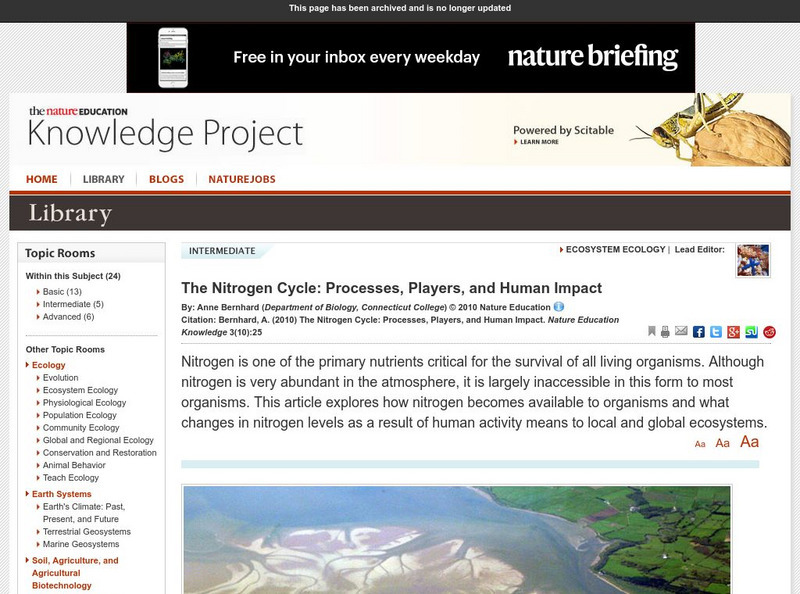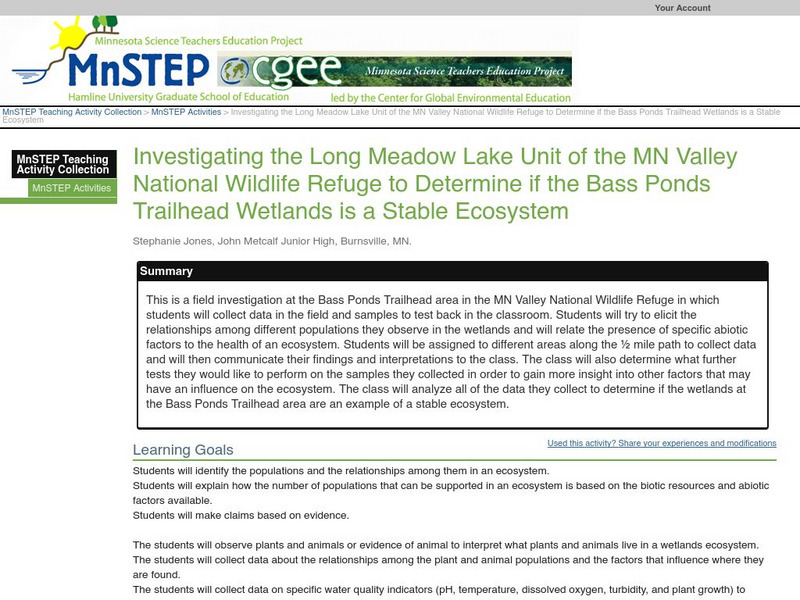Nature Research
Nature: The Nitrogen Cycle: Processes, Players, and Human Impact
Find out how nitrogen is cycled throughout the biosphere as it passes through the nitrogen cycle. Learn about the biotic and abiotic factors involved in the process as well as the implications of human activity on the nitrogen cycle.
Untamed Science
Untamed Science: Biology: World Biomes: Lakes and Ponds Biome
Learn about the biotic and abiotic factors of lakes and ponds as well as learning how lakes form through reading and video clips.
Concord Consortium
Concord Consortium: The Effect of Environmental Factors on the Growth of Plants
How do environmental factors affect the growth, development, and health of organisms? Students explore the effect of environmental factors on traits by investigating factors that affect the growth of plants.
E-learning for Kids
E Learning for Kids: Science: Marshall Islands: How Can We Tell Living Things From Non Living Things?
Andrea lives on the Marshall Islands, and she will teach you about living and nonliving things.
Cornell Lab of Ornithology
Habitat Network: Habitat Feature: Shelter for Reptiles and Amphibians
Find out why creating and conserving habitat for amphibians and reptiles is important.
ArtsNow
Arts Now Learning: Dramatic Living and Non Living [Pdf]
Students explore the differences between living and nonliving things through the lens of the nursery rhyme, "Hey Diddle Diddle." After bringing the characters to life, the students discuss the concepts of living and nonliving and act out...
Sophia Learning
Sophia: Abiotic and Biotic Factors: Lesson 4
This lesson will introduce abiotic and biotic factors, giving examples and comparing/contrasting the two. It is 4 of 4 in the series titled "Abiotic and Biotic Factors."
Sophia Learning
Sophia: Abiotic and Biotic Factors: Lesson 1
This lesson will introduce abiotic and biotic factors, giving examples and comparing/contrasting the two. It is 1 of 4 in the series titled "Abiotic and Biotic Factors."
McGraw Hill
Glencoe Online: Abiotic Factors
Take this 8 question check quiz on abiotic factors. The quiz is multiple choice.
CPALMS
Florida State University Cpalms: Florida Students: Diving the Depths of Underwater Life
A tutorial that explores how and why the distribution of aquatic life is affected by abiotic factors, such as light, temperature, and salinity.
Texas Instruments
Texas Instruments: Glencoe Middle School Science: Biodiversity and Ecosystems
Students will conduct a field investigation to learn about the environment. They will observe biotic and abiotic factors of an ecosystem. Students can use the CBL 2 and a temperature probe to collect data and a graphing calculator to...
BBC
Bbc: Gcse Bitesize: Adaptations, Interdependence and Competition Aqa
The abundance and distribution of organisms in an ecosystem is determined by biotic and abiotic factors. Animals and plants have adaptations to allow them to compete for resources.
Climate Literacy
Clean: Temperature and Precipitation as Limiting Factors in Ecosystems
Learners correlate graphs of vegetation vigor with those of temperature and precipitation data for four diverse ecosystems, ranging from those near the equator to the poles, to determine which climatic factor is limiting growth.
PBS
Pbs Learning Media: Living and Nonliving
What is it that distinguishes a living organism from a nonliving object? This collection of images presents examples that aren't as clear-cut as one might think, enticing students to question the meaning of life.
CK-12 Foundation
Ck 12: Episd: What Are Biomes?
[Free Registration/Login may be required to access all resource tools.] Students will consider the influences that create different biomes. Recognize and classify the types of biomes.
CK-12 Foundation
Ck 12: Episd: Ecosystems
[Free Registration/Login may be required to access all resource tools.] Explore ecosystems and ecology on an introductory level uncovering fact about types of ecosystems and the competitive exclusion principle.
SMART Technologies
Smart: Living and Nonliving Things
Students define the characteristics of living and non-living things, identify living and non-living components of an ecosystem, and identify the roles of organisms in living systems.
National Geographic
National Geographic: Ocean Abiotic Factors
Students define and provide examples of abiotic and biotic factors of different ecosystems. Then they investigate the importance of abiotic factors and physical processes within ocean ecosystems.
Oswego City School District
Regents Prep: Ecosystems/communities
Abiotic factors vary in the environment and determining the types and numbers of organisms that exist in that environment. Factors which determine the types and numbers of organisms of a species in an ecosystem are called limiting...
Other
Digital Library for Earth System Education: Teaching Box: Seasonal Upwelling
A suite of lessons focusing on the process of upwelling. Inquiry-based exploration of seasonal upwelling includes marine food webs, food production in the ocean, wind-driven ocean currents, and seasonal changes in biotic and abiotic...
Science Education Resource Center at Carleton College
Serc: Investigating the Long Meadow Lake Unit of Valley Nat'l Wildlife Refuge
This is a field investigation at the Bass Ponds Trailhead area in the MN Valley National Wildlife Refuge in which students will collect data in the field and samples to test back in the classroom. Students will try to elicit the...
National Geographic
National Geographic: Symbiotic Relationships in Marine Ecosystems
In this lesson learners analyze videos to make observations about species, populations, and communities of organisms and discuss their symbiotic relationships. Then they create a hypothetical marine ecosystem and describe the adaptive,...
CK-12 Foundation
Ck 12: Life Science: 12.11 Habitat and Niche
See how organisms each have their own role in the ecosystem.
Other
Vida: Living and Non Living Things
Study these four images when learning about living and nonliving things.
Other popular searches
- Biotic and Abiotic Factors
- Biotic and Abiotic
- Abiotic and Biotic Elements
- Abiotic and Biotic Resources
- Abiotic and Biotic Environment





![Arts Now Learning: Dramatic Living and Non Living [Pdf] Lesson Plan Arts Now Learning: Dramatic Living and Non Living [Pdf] Lesson Plan](https://static.lp.lexp.cloud/images/attachment_defaults/resource/large/FPO-knovation.png)













